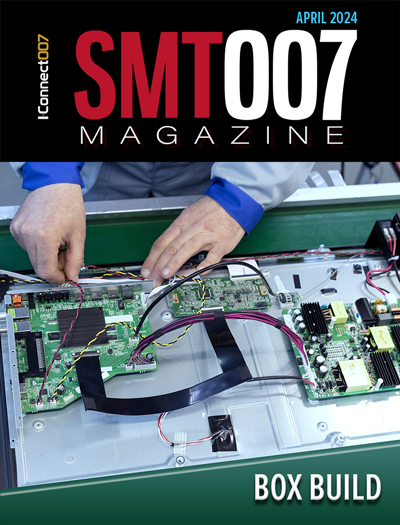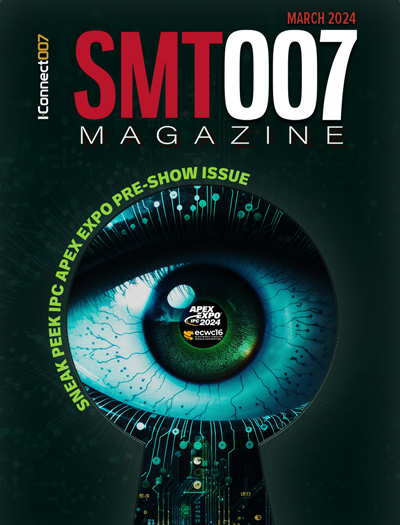-

- News
- Books
Featured Books
- smt007 Magazine
Latest Issues
Current Issue
Box Build
One trend is to add box build and final assembly to your product offering. In this issue, we explore the opportunities and risks of adding system assembly to your service portfolio.

IPC APEX EXPO 2024 Pre-show
This month’s issue devotes its pages to a comprehensive preview of the IPC APEX EXPO 2024 event. Whether your role is technical or business, if you're new-to-the-industry or seasoned veteran, you'll find value throughout this program.

Boost Your Sales
Every part of your business can be evaluated as a process, including your sales funnel. Optimizing your selling process requires a coordinated effort between marketing and sales. In this issue, industry experts in marketing and sales offer their best advice on how to boost your sales efforts.
- Articles
- Columns
Search Console
- Links
- Events
||| MENU - smt007 Magazine
Electronics Industry Welcomes Reintroduction of Bipartisan Proposal to Boost U.S. Printed Circuit Board Sector
May 12, 2023 | IPCEstimated reading time: 1 minute
The electronics manufacturing industry is welcoming the reintroduction of bipartisan legislation in the U.S. Congress that would help rebuild the country’s printed circuit board (PCB) sector.
The Protecting Circuit Boards and Substrates Act, reintroduced today by Reps. Blake Moore (R-UT) and Anna Eshoo (D-CA), incentivizes purchases of domestically produced PCBs as well as support industry investments in factories, equipment, workforce training, and research and development.
The legislation comes amid increasing attention to the wider electronics supply chain into which semiconductors fit. In March, President Joe Biden issued a “Presidential Determination” under the Defense Production Act (DPA) that prioritizes the domestic manufacture of PCBs as a matter of national security. The month before, U.S. Commerce Secretary Gina Raimondo told a podcast that “circuit board” companies would have opportunities for CHIPS Act funding.
IPC President and CEO John W. Mitchell said, “This bipartisan bill addresses well-known vulnerabilities in U.S. electronics manufacturing, taking a ‘silicon-to-systems’ approach that prioritizes greater innovation and resiliency across the entire industry. We thank Reps. Eshoo and Moore for their leadership, and we call on all Members of Congress to support this bill.”
PCBs are as integral to electronics as semiconductor chips, their better-known partners. They are the physical platform upon which microelectronic components such as chips and capacitors are mounted and interconnected. Electronic systems cannot function without PCBs.
However, according to “Leadership Lost,” a report published by IPC, the United States “has lost its historic dominance in the PCB sector.” Since 2000, the U.S. share of global PCB production has fallen from over 30% to just 4%, with China now dominating the sector at around 50%. Any loss of access to non-domestic sources of PCBs would be “catastrophic,” the report said.
Numerous government and industry reports have raised the alarm for almost 20 years. For example, a 2018 Commerce Department report characterized the sector as “dying on the vine,” and the department’s 2022 report on the information and communications technology (ICT) industry noted the same supply chain risks.
Suggested Items
Warm Windows and Streamlined Skin Patches – IDTechEx Explores Flexible and Printed Electronics
04/26/2024 | IDTechExFlexible and printed electronics can be integrated into cars and homes to create modern aesthetics that are beneficial and easy to use. From luminous car controls to food labels that communicate the quality of food, the uses of this technology are endless and can upgrade many areas of everyday life.
Book Excerpt: The Printed Circuit Assembler’s Guide to... Factory Analytics
04/24/2024 | I-Connect007 Editorial TeamIn our fast-changing, deeply competitive, and margin-tight industry, factory analytics can be the key to unlocking untapped improvements to guarantee a thriving business. On top of that, electronics manufacturers are facing a tremendous burden to do more with less. If you don't already have a copy of this book, what follows is an excerpt from the introduction chapter of 'The Printed Circuit Assembler’s Guide to... Factory Analytics: Unlocking Efficiency Through Data Insights' to whet your appetite.
Listen Up! The Intricacies of PCB Drilling Detailed in New Podcast Episode
04/25/2024 | I-Connect007In episode 5 of the podcast series, On the Line With: Designing for Reality, Nolan Johnson and Matt Stevenson continue down the manufacturing process, this time focusing on the post-lamination drilling process for PCBs. Matt and Nolan delve into the intricacies of the PCB drilling process, highlighting the importance of hole quality, drill parameters, and design optimization to ensure smooth manufacturing. The conversation covers topics such as drill bit sizes, aspect ratios, vias, challenges in drilling, and ways to enhance efficiency in the drilling department.
Elevating PCB Design Engineering With IPC Programs
04/24/2024 | Cory Blaylock, IPCIn a monumental stride for the electronics manufacturing industry, IPC has successfully championed the recognition of the PCB Design Engineer as an official occupation by the U.S. Department of Labor (DOL). This pivotal achievement not only underscores the critical role of PCB design engineers within the technology landscape, but also marks the beginning of a transformative journey toward nurturing a robust, skilled workforce ready to propel our industry into the future.
Winner of The Science Show Rakett 69 Receives Incap Scholarship
04/24/2024 | IncapThe winner of the Rakett 69 science show, Andri Türkson, who stood out as an electronics enthusiast, received a scholarship from Incap Estonia, along with an internship opportunity in Saaremaa.


